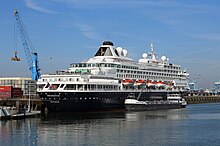




Bunkering is the supplying of fuel for use by ships (such fuel is referred to as bunker),[1] including the logistics of loading and distributing the fuel among available shipboard tanks.[2] A person dealing in trade of bunker (fuel) is called a bunker trader.
The term bunkering originated in the days of steamships, when coal was stored in bunkers.[1] Nowadays, the term bunker is generally applied to the petroleum products stored in tanks, and bunkering to the practice and business of refueling ships. Bunkering operations take place at seaports and include the storage and provision of the bunker (ship fuels) to vessels.[3]
The Port of Singapore is currently the largest bunkering port in the world.[4] In 2023, Singapore recorded bunker fuel[5] sales volume totaling 51,824,000 tonnes, setting a new industry standard.
The Island of Malta is known to host bunkering, in six locations including Hurd's bank. In 2015 the Malta-Sicily Channel was noted as "one of the most important oil transit routes in the world," and in 2011, around eight vessels per day bunkered in Maltese waters.[6]
- ^ a b Manaadiar, Hariesh (August 2011). "What is Bunker and Bunkering". Shipping and Freight Resource. Puthan House. Retrieved 27 June 2016.
- ^ MOHIT (19 October 2010). "Bunkering is Dangerous : Procedure for Bunkering Operation on a Ship". Marine Insight. Retrieved 16 January 2015Site seems to require enabling of cookies.
{{cite web}}: CS1 maint: postscript (link) - ^ "Bunkering". Maritime and Port Authority of Singapore (MPA). Archived from the original on 7 January 2015. Retrieved 16 January 2015.
- ^ "Page 143 - WOO 2014". www.opec.org. Retrieved 2020-11-24.
- ^ "Port of Singapore Achieves Historic Bunker Sales in 2023". Bunker Market. 2024-01-15. Retrieved 2024-03-17.
- ^ "Exposing underwater devastation". 22 March 2015.